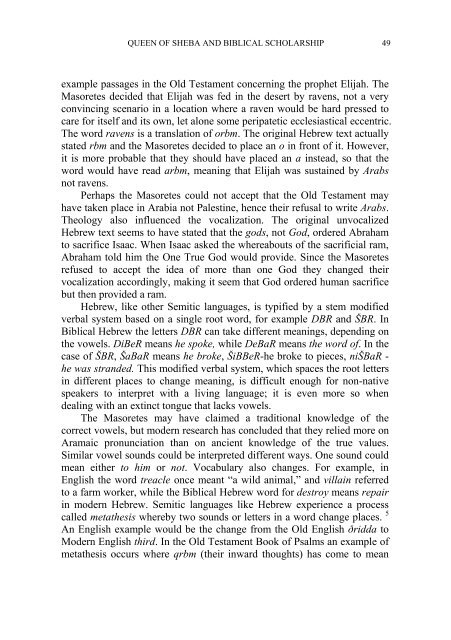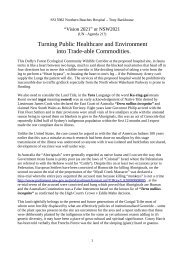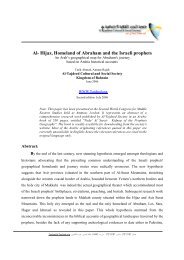Sheba
Sheba
Sheba
Create successful ePaper yourself
Turn your PDF publications into a flip-book with our unique Google optimized e-Paper software.
QUEEN OF SHEBA AND BIBLICAL SCHOLARSHIP 49<br />
example passages in the Old Testament concerning the prophet Elijah. The<br />
Masoretes decided that Elijah was fed in the desert by ravens, not a very<br />
convincing scenario in a location where a raven would be hard pressed to<br />
care for itself and its own, let alone some peripatetic ecclesiastical eccentric.<br />
The word ravens is a translation of orbm. The original Hebrew text actually<br />
stated rbm and the Masoretes decided to place an o in front of it. However,<br />
it is more probable that they should have placed an a instead, so that the<br />
word would have read arbm, meaning that Elijah was sustained by Arabs<br />
not ravens.<br />
Perhaps the Masoretes could not accept that the Old Testament may<br />
have taken place in Arabia not Palestine, hence their refusal to write Arabs.<br />
Theology also influenced the vocalization. The original unvocalized<br />
Hebrew text seems to have stated that the gods, not God, ordered Abraham<br />
to sacrifice Isaac. When Isaac asked the whereabouts of the sacrificial ram,<br />
Abraham told him the One True God would provide. Since the Masoretes<br />
refused to accept the idea of more than one God they changed their<br />
vocalization accordingly, making it seem that God ordered human sacrifice<br />
but then provided a ram.<br />
Hebrew, like other Semitic languages, is typified by a stem modified<br />
verbal system based on a single root word, for example DBR and ŠBR. In<br />
Biblical Hebrew the letters DBR can take different meanings, depending on<br />
the vowels. DiBeR means he spoke, while DeBaR means the word of. In the<br />
case of ŠBR, ŠaBaR means he broke, ŠiBBeR-he broke to pieces, niŠBaR -<br />
he was stranded. This modified verbal system, which spaces the root letters<br />
in different places to change meaning, is difficult enough for non-native<br />
speakers to interpret with a living language; it is even more so when<br />
dealing with an extinct tongue that lacks vowels.<br />
The Masoretes may have claimed a traditional knowledge of the<br />
correct vowels, but modern research has concluded that they relied more on<br />
Aramaic pronunciation than on ancient knowledge of the true values.<br />
Similar vowel sounds could be interpreted different ways. One sound could<br />
mean either to him or not. Vocabulary also changes. For example, in<br />
English the word treacle once meant “a wild animal,” and villain referred<br />
to a farm worker, while the Biblical Hebrew word for destroy means repair<br />
in modern Hebrew. Semitic languages like Hebrew experience a process<br />
called metathesis whereby two sounds or letters in a word change places. 5<br />
An English example would be the change from the Old English ðridda to<br />
Modern English third. In the Old Testament Book of Psalms an example of<br />
metathesis occurs where qrbm (their inward thoughts) has come to mean




